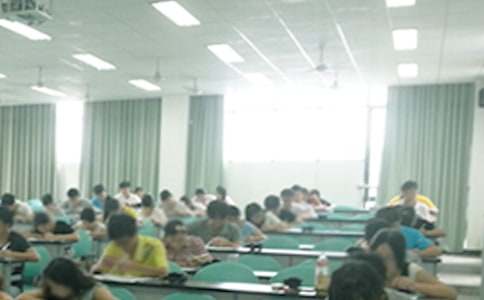- 相关推荐
2017年英语四级考试长篇阅读理解答题技巧
每年英语四级考试都有不少同学表示长篇阅读理解太难了,有没有什么技巧可以补上呢?下面是小编为大家搜索整理的2017年英语四级考试长篇阅读理解答题技巧,希望对大家有所帮助!

1.整体把握文章的脉络至关重要。
段落信息匹配题的题目的顺序与文章的行文顺序完全不符,这就要求考生在阅读文章时整体把握文章的结构和脉络,熟悉文章的写作思路,基本能做到理解每题的中心思想后,能大体定位到文章的相应部分,而不是漫无目的地在全文的每个段落里搜寻。
如样题中的文章:首先引出话题;中间部分主要谈论两方面的内容—大学在全球网罗人才和开展工作,同时大学也在重塑研究方法;最后是大学全球化的影响和作用。把文章这样分成四个部分以后,根据每个题目的内容,就可以找到大体的位置。
2.准确理解题目的内容是前提。
每一道题都是原文信息的再现或转述,只有理解了题目所述内容,才能做好后面的段落信息定位。理解题目内容的关键是:抓句子的主干。冗长的句子,只要抓住了其主干,就不难理解句子的主要含义了。
3.找准题目中的定位关键词是关键。
每一道题都是原文信息的再现或转述,只要找准关键词才能准确定位到原文的段落中。关键词多为:a. 名词或名词短语,这类词是题目和文章谈论的对象,同义替换的可能性较小,是比较可靠的定位关键词,
如样题中第46题中的American universities, global careers, internship 都可以在原文中直接找到;b.数字,如数量、年份等,这类词同义替换的可能性非常小,是较理想的定位关键词,
如样题中第47题中的3.9 percent, 是原文信息的再现;c. 专有名词,如人名、地名、机构名、特殊物质等,这类词几乎没有同义替换或转述的可能性,是非常理想的定位关键词,如样题中第55题中的Danah Boyd就是一个专有名词,可以在原文中直接找到。
【附:英语四级阅读理解】
Imagine you went to a restaurant with a date; had a burger, paid with a credit card, and left. The next time you go there, the waiter or waitress, armed with your profile data, greets you with, "Hey Joe, how are you? Mary is over there in the seat you sat in last time. Would you like to join her for dinner again?" Then you find out that your burger has been cooked and your drink is on the table. Forget the fact that you are with another date and are on a diet that doesn’t include burgers. Sound a little bizarre? To some, this is restaurant equivalent of the Internet.The Net’s ability to profile you through your visits to and interactions at websites provides marketers with an enormous amount of data on you—some of which you may notwant them to have.
Are you aware that almost every time you access a website you get a “cookie”? Unfortunately, it’s not the Mrs. Reid’s type. A cookie on the Internet is a computer code sent by the site to your computer—usually without your knowledge. During the entire period of time that you are at the site, the cookie is collecting information about your interaction, including where you visit, how long you stay there, how frequently you return to certain pages, and even your electronic address. Fill out a survey to collect free information or samples, and marketers know even more about you—like your name, address, and any other information you provide. While this may sound scary enough, cookies aren’t even the latest in technology. A new system called I-librarian Alexa—named for the legendary third century B.C. library in Alexandria, Egypt—does even more. While cookies track what you are doing at one site, Alexa collects data on all your Web activity, such as which sites you visit next, how long you stay there, whether you click on ads,etc. All thisinformation is available to marketers, who use it to market more effectively to you. Not only do you not get paid for providing the information, you probably don’t even know that you are giving it.
英语四级阅读模拟题:
Choose correct answers to the question:
◆1.In the restaurant story, the author may most probably think the waiter or waitress was ________ 。
A. considerate
B. polite
C. irritating
D. unsmart
◆2.The author makes up the restaurant story in order to _______ 。
A.show the good service offered in some Web restaurants
B.criticize some restaurants for too considerate service
C.show the Internet’s ability to collect data on you
D.prove the incredible power of the Internet
◆3.What can be learned about “cookie” from the second paragraph?
A.It was first created by Mrs. Reid.
B.It collects information on you without your knowing it
C.It’s some information sent to your computer about yourself.
D.It’s the latest in technology.
◆4.What can be learned about "Alexa" from the second paragraph?
A.Alexa is named after an ancient hero in Egypt
B.Alexa is installed in libraries.
C.Alexa can collect all the necessary data on you.
D.Alexa can provide more data for marketers than a cookie.
◆5.Which of the following words can best reflect the author’s attitude to cookies and Alexa?
A. Critical
B. Suspicious.
C. Objective.
D. Optimistic.
【英语四级考试长篇阅读理解答题技巧】相关文章:
2015年英语四级考试长篇阅读答题技巧08-22
英语四级阅读理解答题技巧10-16
英语阅读理解答题技巧08-01
高考英语阅读理解高分答题技巧10-15
职称英语阅读理解答题技巧07-23
高考英语阅读理解答题技巧06-06
中考英语阅读理解答题技巧08-22
考研英语阅读理解答题技巧10-24
英语四级阅读考试答题技巧解析08-28
大学英语四级考试长篇阅读理解重点训练07-30